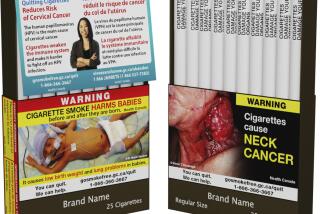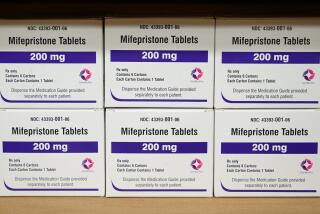FDA Imposes Tough Labeling Rules on Contraceptive Firms
- Share via
WASHINGTON — The Food and Drug Administration imposed tough labeling rules on contraceptive manufacturers Thursday, forcing them to spell out a product’s inability to prevent sexually transmitted diseases.
The FDA strengthened its regulations as part of a campaign to educate the public, because, it said, high-risk sexual behavior is still prevalent, particularly among adolescents and young adults.
One in four Americans gets a sexually transmitted disease at some time in his or her life; there are 12 million new cases a year, according to one recent study. In all, some 56 million Americans are estimated to have diseases spread through sexual contact.
Besides AIDS, those diseases include chlamydia, genital herpes, genital warts, gonorrhea, hepatitis B and syphilis.
Dr. Ruth Merkatz, the FDA’s special assistant for women’s health, said the new labels were needed because “there is a great deal of confusion out there” about what types of birth control protect against infection.
For instance, Merkatz said one young AIDS victim in San Francisco expressed confusion about how she’d gotten AIDS because she’d always taken birth control pills.
The new FDA rules require some contraceptives to state on the package that the products are intended to prevent pregnancy and do not protect against HIV infection--the virus that causes AIDS--and other diseases. That labeling will apply to oral contraceptives, implants such as Norplant, such injectable contraceptives as Depo Provera, natural skin condoms and intrauterine devices.
On oral contraceptives, for instance, the warning will say:
“This product (like all oral contraceptives) is intended to prevent pregnancy. It does not protect against transmission of HIV infection (AIDS) and other sexually transmitted diseases.”
Manufacturers of latex condoms, the only product now allowed to claim effectiveness against disease, will have to state on each individual condom wrapper that the product can help protect consumers if used properly.
The new labels should show up on products in stores within six months, the FDA said.






